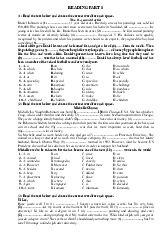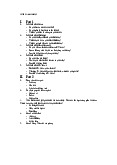






Preview text:
O . H e n r y p T h e L a s t L e a f
IN A SMALL PART OF THE CITY WEST OF
Washington Square, the streets have gone wild. They turn in different
directions. They are broken into small pieces called “places.” One
street goes across itself one or two times. A painter once discovered
something possible and valuable about this street. Suppose a painter
had some painting materials for which he had not paid. Suppose he
had no money. Suppose a man came to get the money. The man might
walk down that street and suddenly meet himself coming back, with- out having received a cent!
This part of the city is called Greenwich Village. And to old
Greenwich Village the painters soon came. Here they found rooms
they like, with good light and at a low cost. 12 T h e L a s t L e a f
Sue and Johnsy lived at the top of a building with three floors. One
of these young women came from Maine, the other from California.
They had met at a restaurant on Eighth Street. There they discovered
that they liked the same kind of art, the same kind of food, and the same
kind of clothes. So they decided to live and work together. That was in the spring.
Toward winter a cold stranger entered Greenwich Village. No one
could see him. He walked around touching one person here and another
there with his icy fingers. He was a bad sickness. Doctors called him
Pneumonia. On the east side of the city he hurried, touching many peo-
ple; but in the narrow streets of Greenwich Village he did not move so quickly.
Mr. Pneumonia was not a nice old gentleman. A nice old gen-
tleman would not hurt a weak little woman from California. But Mr.
Pneumonia touched Johnsy with his cold fingers. She lay on her bed
almost without moving, and she looked through the window at the
wall of the house next to hers.
One morning the busy doctor spoke to Sue alone in the hall, where Johnsy could not hear.
“She has a very small chance,” he said. “She has a chance, if she
wants to live. If people don’t want to live, I can’t do much for them.
Your little lady has decided that she is not going to get well. Is there
something that is troubling her?”
“She always wanted to go to Italy and paint a picture of the Bay of Naples,” said Sue.
“Paint! Not paint. Is there anything worth being troubled about? A man?”
“A man?” said Sue. “Is a man worth—No, doctor. There is not a man.”
“It is weakness,” said the doctor. “I will do all I know how to do.
But when a sick person begins to feel that he’s going to die, half my work
is useless. Talk to her about new winter clothes. If she were interested in
the future, her chances would be better.”
After the doctor had gone, Sue went into the workroom to cry. 13 O . H e n r y
Then she walked into Johnsy’s room. She carried some of her painting
materials, and she was singing.
Johnsy lay there, very thin and very quiet. Her face was turned
toward the window. Sue stopped singing, thinking that Johnsy was asleep.
Sue began to work. As she worked she heard a low sound, again
and again. She went quickly to the bedside.
Johnsy’s eyes were open wide. She was looking out the window and counting—counting back.
“Twelve,” she said; and a little later, “Eleven”; and then, “Ten,”
and, “Nine”; and then, “Eight,” and, “Seven,” almost together.
Sue looked out the window. What was there to count? There was
only the side wall of the next house, a short distance away. The wall
had no window. An old, old tree grew against the wall. The cold breath
of winter had already touched it. Almost all its leaves had fallen from its dark branches.
“What is it, dear?” asked Sue.
“Six,” said Johnsy, in a voice still lower. “They’re falling faster now.
Three days ago there were almost a hundred. It hurt my head to count
them. But now it’s easy. There goes another one. There are only five now.”
“Five what, dear? Tell your Sue.”
“Leaves. On the tree. When the last one falls, I must go, too. I’ve
known that for three days. Didn’t the doctor tell you?”
“Oh, I never heard of such a thing,” said Sue. “It doesn’t have any
sense in it. What does an old tree have to do with you? Or with your
getting well? And you used to love that tree so much. Don’t be a little
fool. The doctor told me your chances for getting well. He told me this
morning. He said you had very good chances! Try to eat a little now.
And then I’ll go back to work. And then I can sell my picture, and
then I can buy something more for you to eat to make you strong.”
“You don’t have to buy anything for me,” said Johnsy. She still
looked out the window. “There goes another. No, I don’t want any-
thing to eat. Now there are four. I want to see the last one fall before 14 T h e L a s t L e a f night. Then I’ll go, too.”
“Johnsy, dear,” said Sue, “will you promise me to close your eyes
and keep them closed? Will you promise not to look out the window
until I finish working? I must have this picture ready tomorrow. I need
the light; I can’t cover the window.”
“Couldn’t you work in the other room?” asked Johnsy coldly.
“I’d rather be here by you,” said Sue. “And I don’t want you to look at those leaves.”
“Tell me as soon as you have finished,” said Johnsy. She closed
her eyes and lay white and still. “Because I want to see the last leaf fall.
I have done enough waiting. I have done enough thinking. I want to go
sailing down, down, like one of those leaves.”
“Try to sleep,” said Sue. “I must call Behrman to come up here. I
want to paint a man in this picture, and I’ll make him look like Behrman.
I won’t be gone a minute. Don’t try to move till I come back.”
Old Behrman was a painter who lived on the first floor of their
house. He was past sixty. He had had no success as a painter. For forty
years he had painted, without ever painting a good picture. He had
always talked of painting a great picture, a masterpiece, but he had never yet started it.
He got a little money by letting others paint pictures of him. He
drank too much. He still talked of his great masterpiece. And he
be lieved that it was his special duty to do everything possible to help Sue and Johnsy.
Sue found him in his dark room, and she knew that he had been
drinking. She could smell it. She told him about Johnsy and the leaves
on the vine. She said that she was afraid that Johnsy would indeed sail
down, down like the leaf. Her hold on the world was growing weaker.
Old Behrman shouted his anger over such an idea.
“What!” he cried. “Are there such fools? Do people die because
leaves drop off a tree? I have not heard of such a thing. No, I will not
come up and sit while you make a picture of me. Why do you allow
her to think such a thing? That poor little Johnsy!”
“She is very sick and weak,” said Sue. “The sickness has put these 15




